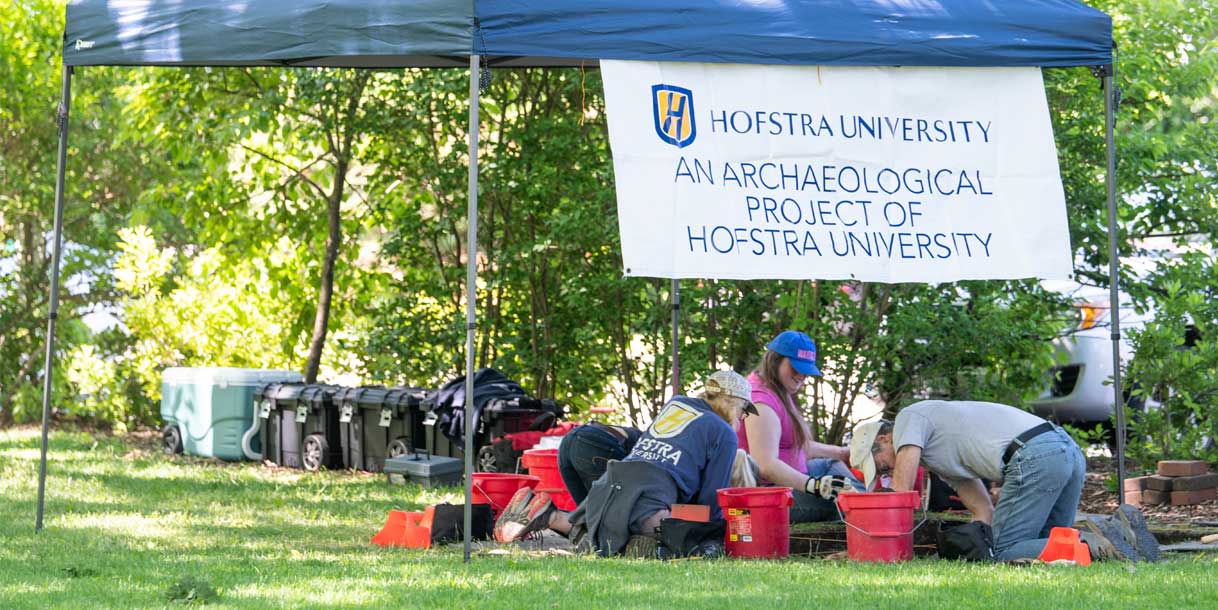
If you have an innate curiosity about human behavior, social organization, and cultural diversity, Hofstra's BA in Anthropology may be the right program for you. In addition to our concentration in Archaeology, we are one of few schools in the New York metropolitan area to offer a minor in the emerging field of Food Studies.

Why Anthropology?
The more you learn about this academic discipline, the more likely you are to ask, “Why not?” Most students have little or no exposure to anthropology before coming to college, except for the occasional National Geographic special. If there is one last refuge of the Renaissance notion of a field covering everything, that place is anthropology. We study human culture wherever it is to be found, how we evolved from earlier primates, and the current social and environmental problems facing the global community.

Degrees and Programs
In small, engaging classes, students learn about people and cultures around the world. They come to understand how humans have evolved from early primates to our current complex societies by examining the development of language, medicine, food, and religion. Course Information

Major in Anthropology
The BA in Anthropology includes classes in four fields of study: physical anthropology (also known as biological anthropology), archaeology, linguistic anthropology, and cultural anthropology. Students can take courses such as Medical Anthropology; Sex, Gender, and Sexuality Cross-Culturally; Archaeology; Forensic Anthropology; and Food & Culture.
Archaeology Option
The Archaeology concentration focuses on studying the past so students can learn how different civilizations have lived and have designed innovations to improve their lives. This concentration includes courses in archaeological techniques, methods and theories, artifact identification, laboratory analysis, and site interpretation.
Minor in Anthropology or Food Studies
Hofstra's minor in Food Studies is one of few such programs in the New York metropolitan area. Students study not only food, but also food systems and cultures, sustainability, health, food history, and obesity and other food crises. A Food Studies minor complements a variety of majors in the social sciences, arts, media and communications, health and natural sciences.
In the Classroom
Learn from the Experts
Our faculty have practical research experience in a wide range of topics and regions. They bring to their classes firsthand knowledge of life in Africa, the Middle East, Europe, Southeast Asia, Latin America, and North America. Their specialties include ethnography, historical archaeology, labor studies, race and racism, gender and sexuality, religion (especially Islam), forensic and medical anthropology, creolization, and class formation.

The Student Experience
Center for Public Archaeology
You may become involved with our Center for Public Archaeology (CfPA), which works closely with local organizations on excavation projects. Our archaeology laboratory boasts a wealth of materials and tools for studying, analyzing, and cataloging artifacts that students discover during fieldwork.
Learning Outside the Classroom
The department offers diverse experiences outside the classroom, ranging from the latest ethnographic films at the Margaret Mead Film Festival in New York to a Native American sweat lodge on Long Island to the annual meetings of the American Anthropological Association.
Internships
Students are encouraged to take advantage of local internship opportunities (ANTH 190 A-Z). Our students have interned at the Brooklyn Museum, American Museum of Natural History, and several nonprofit agencies, including the Pratt Area Community Council in Brooklyn, Make the Road New York, Mothers on the Move, and the Association of Neighborhood and Housing Development, among other places. We have also placed students with Mapping the African-American or MAPP project – an anthropology/archaeology-education project partnership between Columbia University and Hofstra’s Center for Public Archaeology. Approximately 72% of Hofstra social science majors make an internship a part of their academic experience; most complete more than one.
What can I do with my degree?
Anthropologists and archaeologists may be found in many professional settings, including corporations, government, educational institutions, museums, and nonprofit organizations. Corporate anthropologists work in market research, using their understanding and research about human behavior and culture to improve how products and services are delivered. Medical or environmental anthropologists are employed by international development and relief agencies, while forensic anthropologists work in law enforcement and in disaster areas such as ground zero in New York or Puerto Rico in the aftermath of Hurricane Maria.
Find more information at the Bureau of Labor Statistics, U.S. Department of Labor, Occupational Outlook Handbook.

About Our Graduates
A Hofstra degree from the Peter S. Kalikow School of Government, Public Policy and International Affairs provides students with a broad education that can lead to successful careers in numerous areas – nonprofits, corporations, government agencies, museums, human and social services agencies, and others. Students may also continue their studies at prestigious institutions around the country. Information about alumni outcomes
96%
of recent alumni in the social sciences who responded to a survey reported that they were either working or attending or planning to attend graduate school within a year of their graduation.
90%
of those respondents who reported employment said they landed their first position within six months of graduation.
$49K
The mean annual salary among newly graduated social science majors who self-reported salary.
